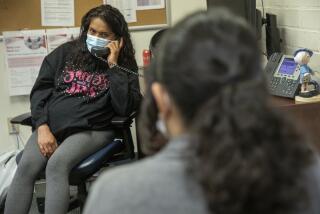UCSD Doctor Defends Advice to Mexicans : Medicine: A pediatric cardiologist calls a state investigation a ‘witch hunt’ and says there was nothing wrong with telling the parents of ill children about better medical care across the border.
- Share via
A UC San Diego physician being investigated by the state for allegedly coaching the parents of Mexican children on how to qualify for free health care in the United States insisted Tuesday that she was in no way guilty of wrongdoing.
Dr. Lilliam M. Valdes-Cruz, a pediatric cardiologist at UCSD who sees patients in university-run clinics in Tijuana and Mexicali, acknowledged in an interview in the office of her attorney that she occasionally tells parents where better care can be obtained.
“But I don’t help them get across,” she said insistently, adding that she feels a medical obligation to inform parents of a better, safer alternative, particularly if a child’s heart condition is serious.
“Sometimes, I have told them that better care would be available in hospitals in Mexico City and San Diego, but if they come here (San Diego), they do so of their own accord,” she said. “It isn’t something I facilitate.”
In October, UCSD’s center of pediatric cardiology became the focus of a controversy, in which state officials began investigating reports that medical care for as many as 100 children who suffer from heart problems was being illegally funded through Medi-Cal.
Officials from the State Department of Health Services believe UCSD Medical Center may have improperly billed the state for at least $1 million. State investigators believe the children were first seen at a Tijuana clinic where UCSD doctors volunteer.
State authorities allege that UCSD doctors aided parents of the children by helping them obtain letters for U.S. immigration officials, certifying that the children would be treated at UCSD without taxpayer expense.
State investigators charged that UCSD officials impeded their investigation by initially blocking attempts to interview staff members and not making key documents available to them. The documents were not available to investigators until subpoenas were delivered for them.
Most of the cases identified by state investigators involve poor children who might otherwise never have had access to American health care. But one case being investigated is that of the infant son of a Mexican cattle rancher who is thought to own thousands of acres, according to state investigators.
Gerald Blank, the attorney for Valdes-Cruz, said Tuesday that several patients had been guilty of wrongdoing in falsifying applications--by, for instance, listing as their own the addresses of relatives living in California--but it was not something that doctors helped them with.
Blank said it was his suspicion that some patients may have attempted to blame doctors, once state authorities began to question them.
Asked if she were part of a “network” that aided Mexican children, poor or otherwise, in obtaining medical care in the United States, Valdes-Cruz said, “There is no network . . . certainly that I’ve been involved in.”
In addition to Valdes-Cruz, the state also is investigating Dr. Azucena Murillo and a hospital secretary, Mercedes A. Alvarado. Murillo, who is not licensed to practice in the United States, worked as a research associate in pediatric cardiology at UCSD Medical Center.
In the wake of the Medi-Cal allegations and the death of a 3-year-old Tijuana boy at the hospital in July, state authorities say Murillo is being investigated for practicing medicine without a license.
According to a coroner’s autopsy, the boy died of a “drug-related accident,” after being given a sedative drawn into an oral syringe by Murillo. The boy died soon after being given the sedative by his mother.
As an outgrowth of the continuing investigations, Dr. David Sahn was removed as head of the pediatric cardiology division late last month. Sahn was replaced by Dr. Kyung Chung, who was named acting head of the division.
UCSD officials have said they are conducting their own inquiries, independent of the state, into allegations of both bogus Medi-Cal payments and the death of the boy.
“When they come to me, I don’t know whether a person has the resources to pay or not,” Valdes-Cruz said Tuesday. “I don’t ask them; that’s not my job. That is determined by whoever determines whether a person can qualify for state care for indigent or low-income people.
“I literally don’t know the nature of employment of three quarters of the parents of the patients I see.”
Asked if she knew their insurance mechanism, Valdes-Cruz said, “Hardly ever. That is not something I get concerned with. I don’t know any physicians who do. It’s a piece of information we take for granted . . . that’s happening elsewhere.
“We don’t particularly pay attention to it. We are not in a private institution. We help people of all sorts, from the rich to the poorest of the poor. I don’t think it makes any difference to most of the people at UCSD. And it is not something I inquire about.”
Valdes-Cruz said many of her patients often travel back and forth between the United States and Mexico.
“It surprises me that people are amazed by things like this happening in a border town,” she said, explaining how easily people move from one country to the other.
“And, in one sense, it disturbs me. I now see a witch hunt surrounding patients with Hispanic surnames.”
Valdes-Cruz said the so-called witch hunt had gotten much worse since the allegations surfaced. But, despite the allegations, she reiterated that she has done nothing wrong and pointed a finger at no one else.
“I don’t think any wrong was committed here, by anybody,” she said. “I don’t see any impropriety . . . at any point.”
More to Read
Sign up for Essential California
The most important California stories and recommendations in your inbox every morning.
You may occasionally receive promotional content from the Los Angeles Times.










